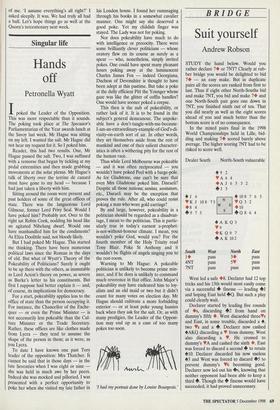Singular life
Hands off
Petronella Wyatt
Ipoked the Leader of the Opposition. This was more respectable than it sounds. The poking took place at The Spectator's Parliamentarian of the Year awards lunch at the Savoy last week. Mr Hague was sitting on my left. I wanted the salt. Mr Hague did not hear my request for it. So I poked him.
Reader, this had two results. One, Mr Hague passed the salt. Two, I was suffused with a remorse that began by tickling at my pedal extremities and then made grabbing movements at the solar plexus. Mr Hague's talk of liberty over the terrine de canard must have gone to my head — because I had just taken a liberty with him.
Sitting around the room were present and past holders of some of the great offices of state. There was the languorous Lord Gilmour, former Lord Privy Seal. Would I have poked him? Probably not. Over to the right sat Robin Cook, nodding his head like an agitated Nibelung dwarf. Would one have manhandled him for the condiments? As Eliza Doolittle said, not bloody likely.
But I had poked Mr Hague. This started me thinking. There have been numerous political laws since the Roman in the days of old. But what of Wyatt's Theory of the Pokeability of Politicians? Surely it ought to be up there with the others, as immutable as Lord Acton's theory on power, as severe as Burke's letter to his constituents. But first I suppose had better explain it — and, of course, its implications for democracy.
For a start, pokeability applies less to the office of state than the person occupying it. For instance, the Chancellor of the Exche- quer — or even the Prime Minister — is not necessarily less pokeable than the Cul- ture Minister or the Trade Secretary. Rather, these offices are like clothes made from Lycra — they tend to assume the shape of the person in them; as it were, as you Lycra.
To date I have known one past Tory leader of the opposition: Mrs Thatcher. It cannot be said that in those days — in the late Seventies when I was eight or nine she was held in much awe by her peers. Indeed she was mocked and pilloried. I was presented with a perfect opportunity to poke her when she visited my late father in his London house. I found her rummaging through his books in a somewhat cavalier manner. One might say she deserved a good poke. Yet my childish finger was stayed. The Lady was not for poking.
Nor does pokeability have much to do with intelligence or precocity. There were some brilliantly clever politicians — whose oratory flew on its course as surely as a spear — who, nonetheless, simply invited pokes. One could have spent many pleasant hours poking away at the luminescent Charles James Fox — indeed Georgiana, Duchess of Devonshire is thought to have been adept at this pastime. But take a poke at the dully efficient Pitt the Younger whose gaze was like the glitter of coffin handles? One would have sooner poked a corpse.
This then is the nub of pokeability, or rather lack of it. It is to be found in the subject's general demeanour. The unpoke- able have a don't-tangle-with-me-because- I-am-an-extraordinary-example-of-God's-di- vinity-on-earth sort of air. In other words, they set themselves aside from the rest of mankind and one of their salient character- istics is often a withering pity for the rest of the human race.
Thus while Lord Melbourne was pokeable — and it was often reciprocated — you wouldn't have poked Peel with a barge-pole. As for Gladstone, one can't be sure that even Mrs Gladstone poked him. Disraeli? Despite all those nations; sanitas, sanitatum, etc., Disraeli may be the exception that proves the rule. After all, who could resist poking a man who wore gold earrings?
By and large, however, pokeability in a politician should be regarded as a disadvan- tage, I mean to the politician. This is partic- ularly true in today's earnest a-prophet- is-not-without-honour climate. I mean, you wouldn't poke God, would you? For the fourth member of the Holy Trinity read Tony Blair. Poke St Anthony and it wouldn't be flights of angels singing you to the rest-room.
Warning to Mr Hague: A pokeable politician is unlikely to become prime min- ister, and if he does is unlikely to command much reverence in that office. John Major's pokeability may have endeared him to loy- alists and an old maid or two but it didn't count for many votes on election day. Mr Hague should cultivate a more forbidding exterior — or at least poke young hussies back when they ask for the salt. Or, as with many prodigies, the Leader of the Opposi- tion may end up as a case of too many pokes too soon.
`I had my portrait done by Louise Bourgeois.'


















































































 Previous page
Previous page